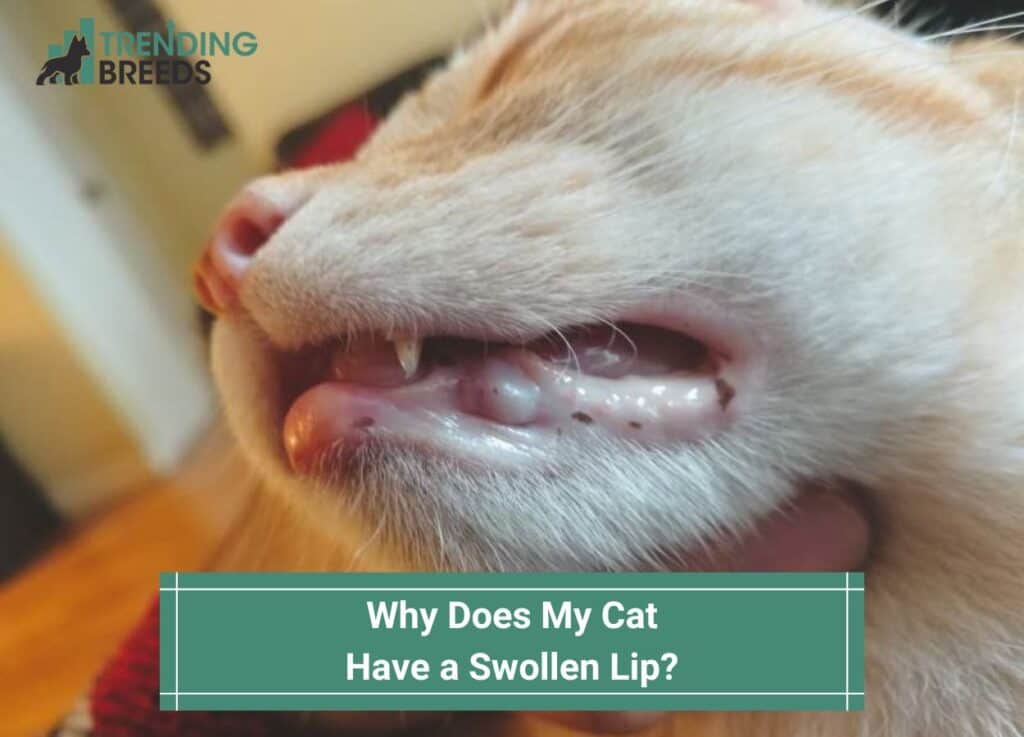
The area around a cat’s muzzle has susceptible tissues that enable them to gather much sensory information. This region of their body, consisting of whiskers, skin, and scent glands, plays a vital role in their daily activities. It might make no sense if you’re wondering, “why does my cat have a swollen lip?”
While most cats do not appreciate humans attempting to examine their mouths, this often leads to undetected oral issues resulting in a swollen lip. So, how can you identify a cat’s swollen lip?
Lip inflammation in cats can result from the Eosinophilic Granuloma Complex, which is quite prevalent. However, dental problems, cancer, infections, or autoimmune diseases can also lead to a swollen lip in cats.
It can be challenging for cat owners to distinguish between these ailments.
However, a swollen bottom lip is relatively easy to notice, whereas identifying swelling in the top lip can be more challenging. Scroll further to learn more about a cat’s swollen lip.
Before you scroll further down this guide, check out these other cat-related articles: Why Is My Cat Scared Of Something I Can’t See? and How Do I Know If My Cat Is Cold?.
Table of Contents
What Are The Symptoms Of a Cat’s Swollen Lip?
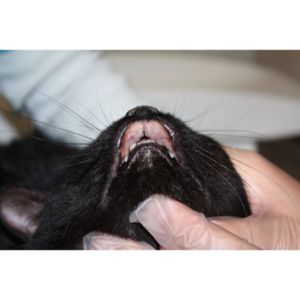
When cats have swollen lips, they may exhibit other physical symptoms. It is crucial to carefully observe your cat and note any unusual signs you may have noticed over the past few months.
Some of the accompanying symptoms that may occur along with lip swelling include:
- Inflammation and puffiness of the lower lip, chin, or top lip
- Presence of scabs or sores that may bleed or ooze pus
- Rash or redness of the gums, accompanied by foul breath odor
- Presence of a lump or tumor
- Bald patches on the lips or chin
- Swollen chin
- Small scabs on the head
- Rubbing or scratching of the mouth or face, along with head shaking
- Changes in appetite and thirst
- Dropping food while eating or chewing on one side of the mouth only
- Grinding of teeth, excessive swallowing, or salivation
- Swollen lymph nodes near the jaw
What Can Cause A Cat’s Swollen Lip?
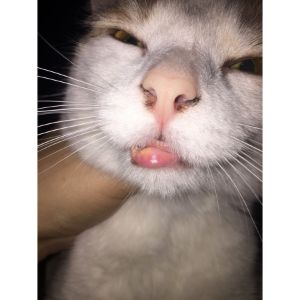
Allergies
While not the most frequent cause of swelling in cats, allergies can be a possible reason for discomfort and swelling.
Just like humans, animals can also suffer from allergies that can lead to symptoms like lip swelling. Allergens, whether from food or the environment (such as dust or certain materials), can cause this reaction.
Consulting with a veterinarian can help you identify potential causes and develop an appropriate treatment to ensure your cat’s comfort and well-being.
If you’ve ever undergone allergy testing yourself, you understand the process.
Dental Issues
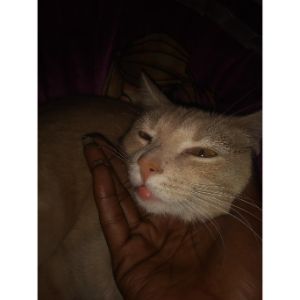
If your cat is having difficulty eating or avoiding it altogether, a swollen lip could indicate an underlying dental problem. Sometimes, a dental abscess or tooth decay can cause swelling that protrudes the lip.
Your veterinarian may prescribe antibiotics to treat the infection, or a minor surgical procedure may be necessary to remove the infected tissue or tooth and alleviate the symptoms.
However, this underscores the importance of prioritizing your pet’s dental hygiene.
Chin Acne
Infected hair follicles on your cat’s chin can be called chin acne. If these follicles are near the mouth, it can cause swelling that appears to be on the lips.
Chin acne can occur for various reasons, including allergies or ingrown hairs.
Your veterinarian can identify the root cause and prescribe a topical treatment to address the infection. Remember, caring for the skin is essential for humans, cats, and dogs!
Eosinophilic Granuloma Complex

Eosinophilic granuloma complex may sound complicated, but it simply refers to an allergic reaction in your cat caused by insect bites from fleas, mosquitoes, or mites.
The affected area may become swollen, red, and itchy, sometimes leading to a large ulcer. The lesions can appear on your cat’s gums, mouth, hind legs, or stomach, and excessive licking and scratching may result in hair loss.
Your veterinarian can diagnose this condition through procedures like needle aspirate and biopsy.
They may prescribe medications to manage the disease, but implementing a flea control program and switching to a hypoallergenic diet may also be helpful.
Once your cat develops this condition, they are more likely to experience it again, so prompt treatment and proper management are crucial.
Tumors Or Cancer
Although it’s not what pet owners want to hear, there is a possibility that their cat‘s swollen lip is due to a tumor on the upper or lower lip.
It is essential to take your cat to the veterinarian, who can examine the swelling and determine if it’s a cancerous or benign growth.
If it is a tumor, treatment options such as surgery are available, and your vet can help assess the quality of life for your cat moving forward. This condition is most common in senior cats.
Injury
Your cat may have experienced a fall and hurt her mouth, leading to the observed swelling.
It’s possible that tooth injuries and interior mouth damage also occurred, requiring medical attention. Examining your cat’s mouth can provide valuable information.
Other Reasons
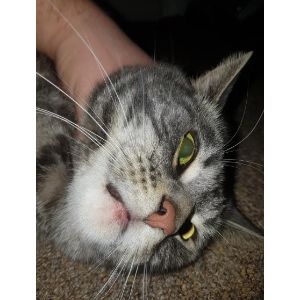
In some cases, the cause of the swelling may be straightforward and may not require any additional treatment.
For instance, if it’s mosquito season, your cat may have a simple mosquito bite, and the swelling may go away in a few days.
Alternatively, your cat may have sustained a minor scratch or injury, which could be causing the swelling. Nevertheless, observing the bump for a few hours or a day is essential to see if there are any changes.
If your cat allows, examine the swelling site to see if you can spot any bump, bruise, bite, or an attached insect like a tick. If possible, clean the area thoroughly to prevent further infections.
What Includes The Diagnosis Process?

Before heading to the vet clinic, gathering information by investigating your home is essential.
Take note if your cat’s appetite or thirst has changed, if there have been any recent changes in cat litter, or if there are new items in the home that your cat may have come in contact with, such as cat food, furniture, rugs, or toys.
It’s also essential to determine if the symptoms are recurring.
Your veterinarian may recommend diagnostic tests to determine the best treatment for your cat’s swollen lip.
These tests may include skin scraping, cultures to check for fungus and bacteria, biopsy, x-ray imaging, blood and urine tests, allergy testing, food allergy trial, or medication trial.
Some FAQs For A Cat Swollen Lip

When should I take my cat to the vet for a swollen lip?
If you notice that your cat has a swollen lip, it’s always a good idea to have your cat checked by a veterinarian. A swollen lip can be a symptom of several health issues, some of which can be serious.
If your cat’s swollen lip has other symptoms, such as difficulty eating or drinking, excessive drooling, lethargy, or changes in behavior, it’s essential to seek veterinary care immediately.
These symptoms may indicate a more serious underlying condition that requires prompt medical attention.
If the swelling is mild and your cat is otherwise healthy, you can monitor it for a day or two to see if it improves. However, the bulge doesn’t go down or seems to be getting worse.
In that case, it’s best to have your cat examined by a veterinarian to determine the underlying cause and appropriate treatment.
Why does my cat have a lump on its bottom lip?![]()
Swollen lips in cats can occur due to various oral tumors, some of which may be cancerous. A surgical biopsy is required to determine if the tumors are benign or malignant.
Squamous cell carcinoma, malignant melanoma, and fibrosarcoma are the three most common types of oral tumors in cats, all of which have a poor long-term prognosis.
Sometimes, lip swelling may result from skin cancer, such as cutaneous lymphoma or mast cell tumors, which can resemble the typical Eosinophilic Granuloma Complex (EGC). Again, a biopsy is necessary to diagnose these cancers.
Can cat allergy cause a swollen lip?
Yes, a cat allergy can cause a swollen lip in some people allergic to cats.
When a person with a cat allergy comes into contact with cat allergens, their immune system may overreact and cause symptoms such as sneezing, runny nose, and itchy, watery eyes.
In some cases, exposure to cat allergens can also cause lips, face, and throat swelling. It is known as angioedema and can be a severe allergic reaction that requires prompt medical attention.
It is important to note that cat allergies are not a result of a cat’s saliva or fur but of proteins found in their dander, urine, and saliva.
Why does my cat have a blister on his lip?
There could be several reasons why a cat might have a blister on its lip. It could be due to an insect bite or sting, a cut or injury to the lip, an allergic reaction, a bacterial or viral infection, or an underlying medical condition.
The blister could also be a symptom of a more severe disease such as oral cancer or an eosinophilic granuloma complex.
It’s best to have a veterinarian examine the blister and determine the underlying cause to provide appropriate treatment.
What does it mean when a cat’s lip is swollen?
When a cat’s lip has swelled, it can indicate several possible issues, such as an allergic reaction, injury, insect bite or sting, dental problems, oral tumors, or skin conditions.
In some cases, the swelling may be due to other symptoms such as pain, redness, discharge, and difficulty eating or drinking.
Therefore, having your cat examined by a veterinarian if you notice any swelling on its lip is crucial.
So Why Does My Cat Have a Swollen Lip?

A cat’s swollen lip can result from various conditions such as allergies, dental issues, chin acne, eosinophilic granuloma complex, tumors or cancer, and injury.
It is essential to identify any accompanying symptoms that may occur along with lip swelling and seek the assistance of a veterinarian to determine the underlying cause.
Proper diagnosis is vital for effective treatment, and delaying it may lead to further complications. Early intervention can prevent pain and discomfort and improve the quality of life for the cat.
If you find this guide, “Why Does My Cat Have a Swollen Lip,” informative and helpful, you can check out these other animal-related articles from our team:
- What Over The Counter (OTC) Medicine For A Cat’s Upset Stomach?
- How To Drain a Cyst On Your Cat
- How To Put Your Cat on a Diet
You can learn more about this topic by watching “Cat With Swollen Lip: Rodent Ulcer, Allergy” down below:




